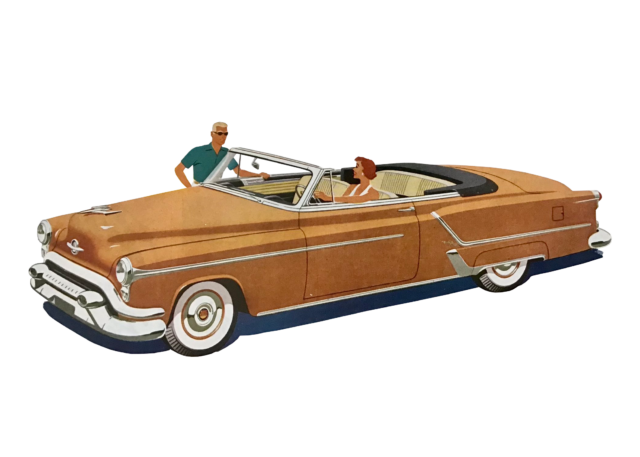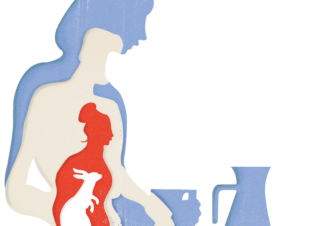
In our Modes of Transportation series, authors share notes from time spent in transit.
There is a peculiar doublethink required to travel alone as a young woman. You must expect that every straight-seeming man you meet wants to fuck you or kill you. This helps you stay safe. However, only a paranoid egomaniac would constantly imagine these threats, so you must also act as if you aren’t thinking this at all.
When I was in my early twenties and studying in Wisconsin, I flew back to New York as often as time and funds would allow. I’d stay with my grandmother and see the friends I loved in the city. There were particular joys to the short-haul flight, usually on Delta. The full-sized cans of Diet Coke. The Biscoff cookies with their fulsome spicy snap. Sometimes, I’d be sat next to a woman or a teenager, in which case we’d pass the journey ensconced in our books or devices. Sometimes, I’d sit next to a man and we’d pass the flight in polite silence, each being careful not to the elbow the other in the ribs. But often they’d decide to talk, to ask me about what I was studying, where I was going, where my face or accent were from. Trying to project friendly distance, I would ask them questions in return. Why were they traveling?
I am used to being careful with men. I have had my fair share of unpleasant encounters. Back in Wisconsin, I had a stalker. He was such a mild-mannered person that I felt confused and embarrassed talking about it. He would show up where I was: the computer lab, events, the building where I studied and taught. Once when I was sick, he showed up outside my apartment with cartons of orange juice. He worked for the university, and someone suggested I submit a formal complaint. I didn’t want to get him fired. Had he really done anything bad? But did I want to wait until he did?
Many of the conversations with the men on the plane were so innocent that I have forgotten them entirely. Some were sweetly banal. A young engineer showed me pictures of himself and his car. It was a sports car, and he was particularly proud. He had moved to the Midwest to work for an automobile manufacturer. He also showed me pictures of cars he didn’t own but would like to one day. I cannot drive. My parents did not own a car and on the occasions they rented one, neither demonstrated much skill. My father liked to drive at eighty or ninety miles an hour on narrow one-lane Scottish roads to make my mother scream. My mother once drove so slowly on the highway she was asked by the police to speed up. But I nodded along to the engineer. I tried to look impressed.
The journey often had a stopover in Detroit, so this was not the last car man I met. The most memorable of them worked in advertising. He wore a suit and had a tablet computer that he had placed on the narrow tray table. His grey hair was neatly cropped. I would have guessed that he was in his fifties. We exchanged the usual pleasantries. Then he started to tell me about selling cars. I had seen plenty of car advertisements. And yet, I could not tell you the models of any of the cars I have seen over the years. My brain seems to wipe them out. I’ve only noticed that newer cars seem softer and smoother, as if trying to become sea pebbles or snail shells. But their other qualities pass me by. Perhaps I am not the target market.
I was truly interested in what this man had to say. This is what he told me: When a car is expensive, full of technology and special features—they emphasize science. The car will drive past modern buildings, glassy and angular, or maybe even a space station. He spoke with a kind of fondness, as if this was the sort of car he owned. When a car is terrible or cheap, they put it in nature—on the wild open road. The car has nothing special about it. So, all they can sell is freedom. He spoke in a warm conspiratorial voice. Not quite Don Draper, more a gentle magician showing how the trick is played. I felt oddly safe. We were the smart ones. We would not be tricked by the dream of liberty. We knew that those cars would never be driven past cacti and red sand but would instead drag their owners on shitty suburban commutes. He showed me some pictures of cars. He told me about his wife. Perhaps I even leaned toward him to look at the screen.
As we landed, he asked me if I’d like to share a taxi back from the airport. The taxi back from JFK was expensive, a large part of the cost of the trip. I thought about what my mother and my friends would say. I thought about how I didn’t want to fuck him or get murdered.
I said yes.
The cab was yellow as New York cabs are and smelled of sweat and synthetic leather as New York cabs do. I didn’t know its make or model. He said he’d take me where I was going first. He sat next to me in the cab as he had in the plane. I asked more about his wife. He dropped me at my grandmother’s building. I didn’t die. He never touched me. Not even my hand. And still I felt like I had done something foolish.
I am older now and no longer make that commute. I still can’t drive and don’t own a car. I want a society with comprehensive public transportation and minimal car use. Still though, I think of those cheap cars driving over mountains and deserts, past oceans. Sometimes, I close my eyes and dream of traveling alone and free.


